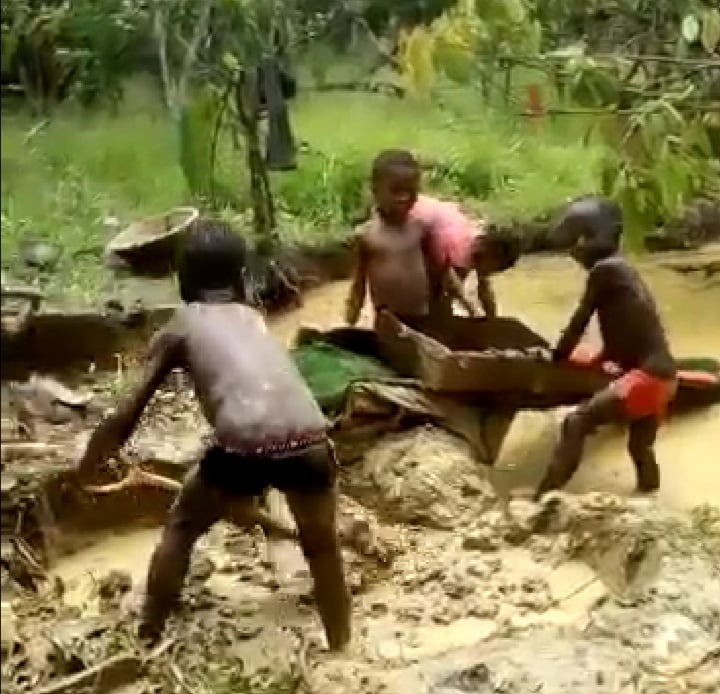Dr. Freda Prempeh, former Member of Parliament for Tano North and a prominent advocate for children’s rights, has vehemently condemned the exploitation of children in illegal mining activities, commonly known as galamsey, in Ghana. She argues that this practice not only deprives children of their right to education and jeopardizes their future prospects but also poses significant risks to their physical and mental well-being. Dr. Prempeh’s condemnation follows a disturbing video circulating on social media depicting young children actively involved in galamsey operations, highlighting the urgent need for intervention. She appealed directly to the Ministry of Gender, Children and Social Protection, local government bodies, and civil society organizations to take swift and decisive action to curtail this detrimental practice and protect vulnerable children from exploitation. Dr. Prempeh stressed that while eradicating illegal mining completely may be a complex challenge, allowing families to exploit children in this harmful activity is unacceptable and requires immediate attention.
The former MP emphasized the critical role of education in shaping a child’s future and expressed her deep concern for the bleak prospects facing children engaged in galamsey. She called on the government, particularly the Ministry of Gender, Children and Social Protection, to create a safe and supportive environment that fosters the holistic development and well-being of children. Dr. Prempeh underscored the importance of providing children with opportunities to thrive rather than being subjected to the hazardous and exploitative conditions of illegal mining. She believes that the government must prioritize the welfare of its youngest citizens and demonstrate a strong commitment to protecting them from harmful practices that undermine their potential.
Beyond the immediate impact on children’s education and future opportunities, Dr. Prempeh also highlighted the broader societal consequences of galamsey. As the founder of the Ultimate Women Foundation (UWF), which focuses on empowering vulnerable women and girls, she emphasized the devastating environmental and health risks associated with illegal mining. Galamsey activities not only degrade the environment and pollute water bodies but also contaminate food crops, leading to long-term health problems and economic repercussions for communities. Dr. Prempeh argues that addressing the root causes of galamsey, poverty and lack of opportunity, is crucial for protecting both the environment and the well-being of communities affected by this illicit activity.
Dr. Prempeh expressed disappointment that some families, instead of seeking alternative means of livelihood, are resorting to involving their children in galamsey, further perpetuating a vicious cycle of poverty and exploitation. She contrasted this with the work of her foundation, UWF, which strives to equip vulnerable women and girls with the skills and resources they need to contribute meaningfully to society and escape the clutches of social ills like galamsey. She emphasized the importance of providing alternative opportunities and support systems for families struggling to make ends meet, reducing the temptation to resort to harmful practices like child labor in illegal mining.
The former MP’s call for action extends beyond mere rhetoric. She urges the government, state institutions, and civil society organizations to go beyond lip service and implement concrete measures to address the menace of galamsey and child exploitation. Dr. Prempeh believes that tackling this complex issue requires strong political will and decisive action from the highest levels of government, calling upon President John Dramani Mahama to demonstrate leadership in combating this destructive practice. She advocates for a comprehensive approach that includes stricter law enforcement, community sensitization, and the creation of sustainable alternative livelihood opportunities for those currently involved in illegal mining.
Dr. Prempeh’s passionate plea highlights the urgent need for a multifaceted response to the problem of child exploitation in galamsey. Protecting children from this harmful practice requires a collaborative effort involving government agencies, civil society organizations, community leaders, and families themselves. By addressing the root causes of poverty and providing alternative pathways to economic security, Ghana can break the cycle of exploitation and ensure a brighter future for its children, safeguarding their right to education, health, and a life free from exploitation. Ultimately, eradicating child labor in galamsey is not just a legal imperative but a moral obligation that demands immediate and sustained action.














